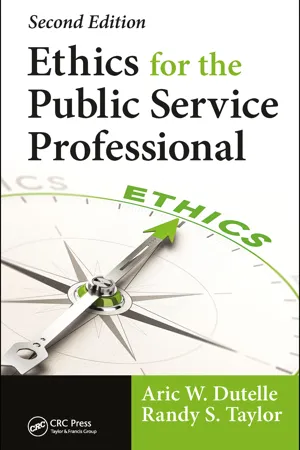
- 257 pages
- English
- ePUB (mobile friendly)
- Available on iOS & Android
Ethics for the Public Service Professional
About this book
Headlines of public service corruption scandals are painful reminders of the need for continuing education in the subjects of ethics and integrity. Public service professionals employed as government officials, forensic scientists, investigators, first responders, and those within the legal and justice systems, face daily decisions that can mean the difference between life or death and freedom or imprisonment. Sometimes, such decisions can present ethical dilemmas even to the most seasoned of professionals.
Building on the success of the first edition, Ethics for the Public Service Professional, Second Edition serves as a single-source resource for the topic of ethics and ethical decision making as it relates to government service. While incorporating an examination of the history of ethics, codes and legislation, the book exposes the reader to the challenges faced by today's public service professionals and administrators in incorporating ethics within daily decisions, procedures, and duties.
Key features include:
- Current controversies in police, forensic, and other public service sectors including: racial profiling, evidence tampering, disaster response, and audits
- Important new mechanisms of accountability, including use-of-force reporting, citizen complaint procedures, and open government
- Contemporary news stories throughout the book introduce the reader to a broad range of ethical issues facing leaders within the public service workplace
- Chapter pedagogy including key terms, learning objectives, end-of-chapter questions, a variety of boxed ethical case examples, and references
- Ripped from the Headlines current event examples demonstrate actual scenarios involving the issues discussed within each chapter
This in-depth text will be essential for the foundational development and explanation of protocols used within a successful organization. As such, Ethics for the Public Service Professional, Second Edition will help introduce ethics and ethical decision-making to both those new to the realm of forensic science, criminal justice, and emergency services and those already working in the field.
Frequently asked questions
- Essential is ideal for learners and professionals who enjoy exploring a wide range of subjects. Access the Essential Library with 800,000+ trusted titles and best-sellers across business, personal growth, and the humanities. Includes unlimited reading time and Standard Read Aloud voice.
- Complete: Perfect for advanced learners and researchers needing full, unrestricted access. Unlock 1.4M+ books across hundreds of subjects, including academic and specialized titles. The Complete Plan also includes advanced features like Premium Read Aloud and Research Assistant.
Please note we cannot support devices running on iOS 13 and Android 7 or earlier. Learn more about using the app.
Information
1EthicsA Look at the Basics
- Descriptive ethics
- Ethics
- Meta-ethics
- Morals
- Normative ethics values
- Define ethics.
- Define and distinguish between morals, values, and ethics.
- Define and differentiate among the three types of ethical subdivisions.
- Differentiate between personal and political ethics.
- Understand how ethics and morals are separate from law.
What Are “Ethics”?
Revisiting the Basics
Morals, Values, and Ethics

- Normative ethics: How moral values should be determined. (What do individuals think is right?)
- Descriptive ethics: What morals are actually followed or adhered to. (How should individuals act?)
- Meta-ethics: The fundamental nature of ethics, including whether it has an objective justification, how individuals determine for themselves what societal norms to follow. (What does it mean to be “right”?)
Ethical Subdivisions
Normative Ethics
Table of contents
- Cover
- Half Title Page
- Title Page
- Copyright Page
- Dedication
- Contents
- Preface
- Acknowledgments
- Author
- Introduction
- Chapter 1 EthicsA Look at the Basics
- Chapter 2 Ethical Perspectives
- Chapter 3 Ethical Decision Making
- Chapter 4 Leadership Ethics
- Chapter 5 Ethical Codes and Standards
- Chapter 6 Ethics in Law Enforcement
- Chapter 7 Ethics in Forensic Science
- Chapter 8 Ethics in Corrections Systems
- Chapter 9 Ethics in the Legal System
- Chapter 10 Ethics in Public Office
- Chapter 11 Ethics in Other Areas of Public Service
- Chapter 12 Ethics Training and Education
- Chapter 13 The Future of Public Service Ethics
- Appendix A
- Appendix B
- Appendix C
- Appendix D
- Appendix E
- Appendix F
- Glossary
- References
- Index